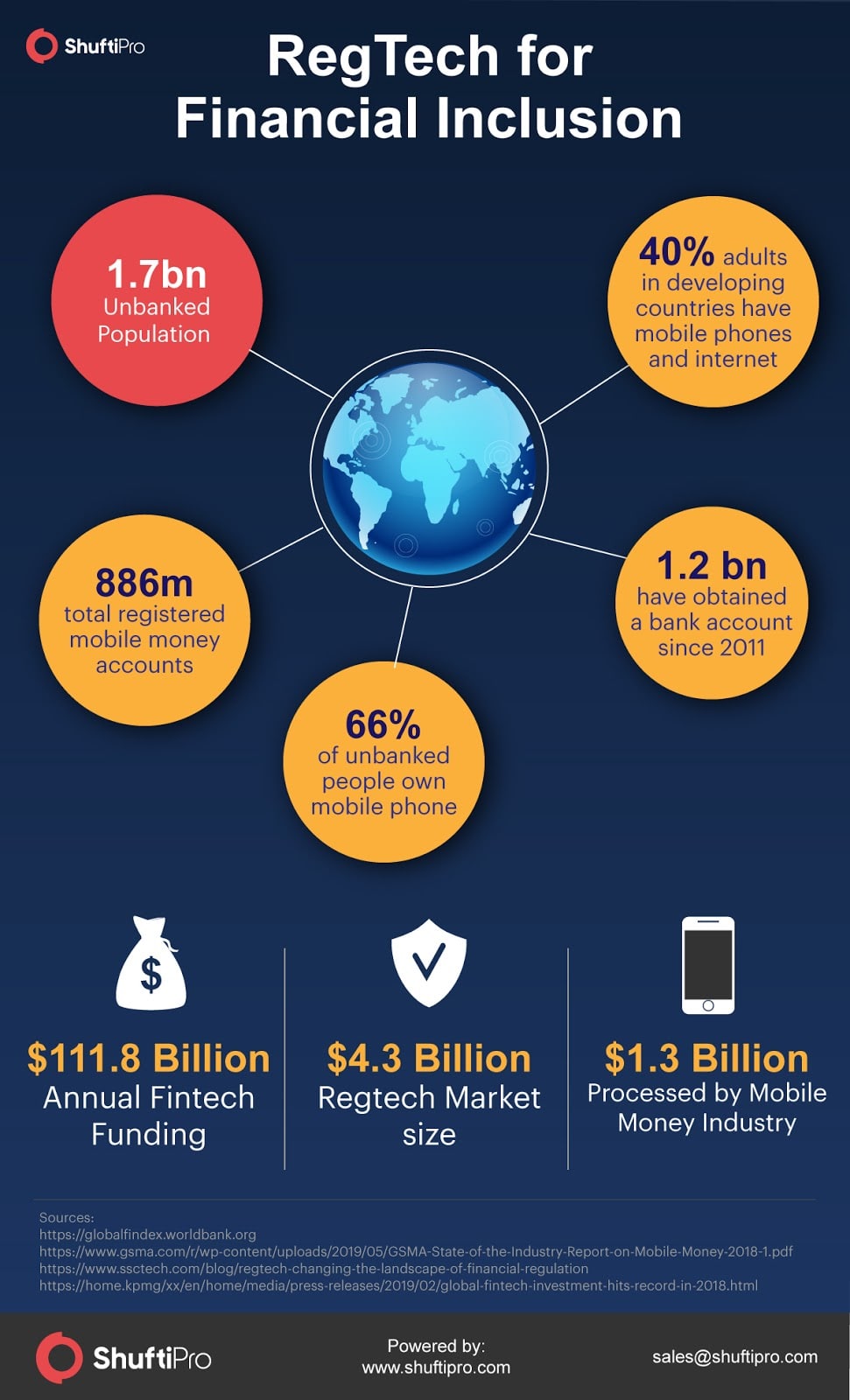RegTech: The Case for Financial Inclusion

The FinTech industry has grown tremendously in recent years, introducing both scale and efficiency in new banking technologies. According to Statista, at an annual growth rate of 18%, the global transaction value in FinTech is expected to grow to $8 trillion by 2022. But according to research by Thomson Reuters, the financial industry spends at least a day, weekly, to track regulatory shifts which can be increasingly time-consuming and costly. So as the fintech and compliance costs continue to grow, RegTech seems to be getting global attention from the financial sector, as well.
Traditional financial service providers (banks, insurance, transactions, and payment services, mobile wallet payments) have no option but to catch up with changing tides, in order to survive the technology revolution. From cutting costs to providing seamless transaction experiences, FinTech and RegTech both have changed the way individuals and businesses manage money.
The world has witnessed more transparency in banking, and, financial transactions are thriving with the use of disruptive technologies such as AI, machine learning, and blockchain. Fueled by the advent of the internet, FinTech has now grown to taller heights with mobile payments and online banking.
Reaching the Unbanked
One of the marked success of this digital wave is how it has led to increased access for previously unbanked populations, largely due to mass outreach of mobiles and the internet. Now, mobile phones are making it possible for more and more people to enter the global financial system, albeit with limited access to services such as mobile payments and transfers.
The mobile money market is witnessing a revolutionary transformation fueled largely by:
- Growing focus on customer experience
- Diversified financial services structure
- Evolving regulatory landscape
- Expanding mobile money services
Mobile money accounts, as well as text and app-based financial accounts, are providing financial coverage to growing global populations. A small but rising percentage is also taking advantage of smartphone technology around the world. However, this is subject to the availability of adequate underlying infrastructure such as power supply. The challenge is greater in developing countries where only 40% of adults have access to both the internet and mobile phones, as opposed to 82% in high-income economies.
Online Security and meeting global compliance is still a topmost priority for customers and businesses alike. For this reason, digital banks are also focusing on RegTech in banking solutions for building long-term trust in the market.
How RegTech and FinTech are related
A large customer base is currently left unserved in the financial services industry due to a lack of the right infrastructure. As the FinTech revolution continues to benefit the economy and break into new markets, it promises to close gaps in financial inclusion. However, this comes with high risks of exploitation that need to be managed.
Currently, 1.7 billion people in the world are unbanked, down from 2 billion in 2014. This is one of the most challenging pain points for financial service providers. FinTech is changing this, and RegTech can accelerate the process.

RegTech startups are experiencing growth and investment at almost the same rate as the FinTech industry. Firms are realising the need to capitalize on compliance efficiency and use it for a competitive edge in the industry. There is great potential for powering the future of financial regulation by integrating technologies into supervisory systems used by banks.
RegTech has major implications for financial institutions in the form of reduced regulatory costs and improved operational efficiency. With far-reaching benefits for the economy, RegTech in banking is also aspiring to drive growth and profitability by better regulatory reporting and risk management, as well as transaction monitoring.
This is especially relevant for emerging markets, where a notable percentage of the population can experience compounded benefits from access to services like micro-credit and remittances. The effective use of RegTech in banking strikes a balance between access to credit and credit security.
With machine learning, artificial intelligence, and e-KYC (Know-Your-Customer) verification methods, the gains are far-reaching. Fraud mitigation and reduced compliance costs make it possible for FinTech to include more financially excluded population segments. Automated KYC processes through RegTech ensure that foolproof methods for legal use of financial services can be made effective. Using API code, RegTech can also simplify complex regulations that optimise compliance costs of time and labor.
Both financial institutions and regulatory authorities see added value in the adoption of RegTech for better compliance and service delivery. APIs for data collection and reporting have also shown a marked improvement in customer engagement, as well as compliance.
RegTech solutions and AML compliance
RegTech solutions are increasingly used by financial institutions to comply with the regulation of anti-money laundering and the evolution of other financial crimes. There is no denying the fact that eliminating the crimes of money laundering has been one of the biggest challenges for financial institutions over the years when new and improved methods of money laundering are on the rise. But regulatory technology (regtech) is helping financial institutions to eliminate financial crimes through regular AML checks, set into motion by regulatory authorities.
Regtech solutions for AML compliance offer a cost-saving solution to the financial sector for real-time identity verification, crime monitoring, and reporting. It not only improves the efficiency of the entire system but also reduces operational costs altogether.
With the use of intelligent technologies, RegTech in banking is a frictionless solution that can reduce time by easily screening people against vast databases. The regulatory landscape is subjected to regular change, this evolution of regulatory trends affect the business operations directly. That’s why RegTech solutions and AML compliance is the need of the hour.
Service offerings by RegTech
Driven largely by business demand and technology innovation, there are five main service offerings by RegTech :
- Regulatory reporting
- Risk management
- Identity management and control
- Compliance
- Transaction monitoring
Challenges in Financial Service Delivery
As financial services become more digitized and pervasive, regulatory systems need to adopt more forward-thinking ways of digital transformation.
The foremost challenge in providing digital financial services to previously unserved populations is risk management. In most cases, financial authorities are still learning their way into the digital revolution. If vast amounts of data are collected without apt use of APIs, serious data security concerns could arise. This could undermine the regtech revolution and make the onboarding process more complex for new entrants.
Supporting infrastructure in the form of digital databases is also absent in most cases. While there is a steep demand for mobile money accounts, some key services such as government payments (pensions, wages, social benefits) are still paid in cash. This reinforces financial exclusion for large segments of the population who could otherwise benefit from services such as mobile payments.
Additionally, stringent identity verification requirements, such as those in KYC, get in the way of digital relevancy. National identity document verifications are sometimes not enough to ensure that people from remote areas can open an account and other local documents are required for account opening. This opens up a range of opportunities for the RegTech industry to influence financial service delivery, and in turn financial inclusion.
RegTech Solutions: Closing Delivery Gaps
Across the globe, traditional financial systems are increasingly embracing technological advancements and committing to streamlining regulatory networks. Regulatory sandboxes and ‘reg labs’ are now being facilitated for innovation, to cater largely to the spike in RegTech solutions and AML compliance in both developed and developing countries.
Sandboxes are controlled spaces for tech firms to test out new technologies under the regulator’s supervision. In addition to offering room for innovation, RegTech sandboxes can also be used as effective feedback and communication channels between FinTechs, regulators, and RegTech solution providers. For financial inclusion, this means balancing innovation and risk to reach underserved customers.
Improving access to mobile money markets also depends a great deal on the efficient implementation of KYC regulations. In areas where access to financial services is a challenge, fulfilling tedious document verification requirements can be a cumbersome task. This stands in the way of scaling mobile money networks, hence hurting financial inclusion.
This is where RegTech plays a central role. By simplifying customer onboarding processes, through efficient use of AI and HI, the mobile money industry can get a real push. The use of innovative e-KYC technologies such as biometric authentication and digital ID systems can make the process more efficient.
With tangible results in the form of financial stability and customer engagement, investment in better regulation technology is being recognised as key to an efficient financial system. A sound regulatory environment, with regtech applications that support risk management, will ensure that economies reap maximum value from the FinTech revolution.

 Explore Now
Explore Now













